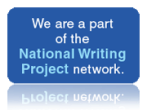Reflections from an Author: Why Teachers Must Write (Guest Post)
By Frank Murphy
Recently, Lynne Dorfman wrote a Teacher to Teacher post about using my newest book, Take a Hike Teddy Roosevelt, as a mentor text to help guide the instruction of teachers of young writers. (Of course, I was, and still am, flattered!!) Soon after, on a Saturday in January, we co-presented on the same topic for some dedicated members of the Capital Reading Council in Harrisburg, PA.
In a nutshell, I started the event off by sharing the story of how Teddy became so dedicated to environmental conservation; then Lynne went about analyzing how she could use this book as a mentor text for elementary school student writers. (If you’ve never seen Lynne present – she’s like a literary surgeon on Skittles!!). She focused on many things, from strong verbs to exact nouns. Even artful sentence fragments! (I hope she thought that one was artful!) All of Lynne’s analysis forced me to recollect so much of the writing and rewriting and imagining of writing that I did over the last few years of constructing and crafting this book in collaboration with my editor, Anna Membrino. It also made me reflect on a recent lesson that I taught to my current sixth grade students that I’ll discuss later. Read more
 I’ve always admired my father’s garage. It is organized. Utility shelves on the left. Steel pegboards and hooks on the rear and right walls. Every tool has its place. He knows where everything is, yet he is constantly revising the content of the garage.
I’ve always admired my father’s garage. It is organized. Utility shelves on the left. Steel pegboards and hooks on the rear and right walls. Every tool has its place. He knows where everything is, yet he is constantly revising the content of the garage. Think Hershey. What comes to mind: chocolate, adventure, shopping? Definitely. And here’s one more opportunity that might interest you – PETE&C (The Pennsylvania Educational Technology Expo and Conference). Yes, Hershey. PA has a lot to offer its visitors throughout the year, and as it plays host to this annual statewide event in February, it brings together educators, innovators, students, vendors and exhibitors all focused on efficient and purposeful uses of technology in the field of education. A few weeks ago, I attended the ninth annual Conference and was sweetly rewarded with many opportunities to learn, grow and connect in this
Think Hershey. What comes to mind: chocolate, adventure, shopping? Definitely. And here’s one more opportunity that might interest you – PETE&C (The Pennsylvania Educational Technology Expo and Conference). Yes, Hershey. PA has a lot to offer its visitors throughout the year, and as it plays host to this annual statewide event in February, it brings together educators, innovators, students, vendors and exhibitors all focused on efficient and purposeful uses of technology in the field of education. A few weeks ago, I attended the ninth annual Conference and was sweetly rewarded with many opportunities to learn, grow and connect in this 



